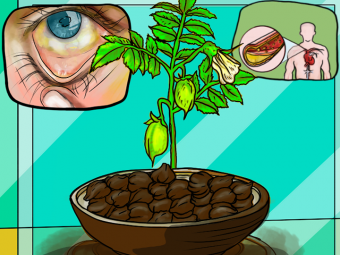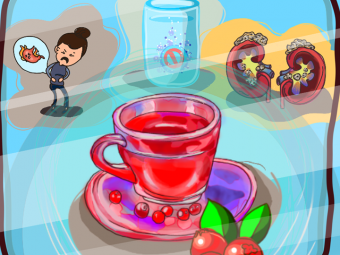The nutrient-dense composition and antioxidants are responsible for the health benefits of maqui berries. These berries may help lower cholesterol and blood glucose levels and reduce inflammation. They also help one combat metabolic disorders like diabetes, obesity, and cardiovascular disorders. You can easily incorporate these berries into your smoothies, oatmeal, and desserts. Here, we will further discuss the benefits, ways of intake, and potential risks of maqui berries. Take a look.
In This Article
What Is Maqui Berry?
Maqui berry (Aristotelia chilensis) is an edible berry endemic from central and southern Chile. It appears dark purplish due to its rich anthocyanin content. Traditionally it was used by native South Americans as an astringent and an anti-laxative (1). It tastes similar to blackberries and has a rich nutrient profile like acai berries.
Find out the numerous health benefits of maqui berries in the next section.
What Are Maqui’s Health Benefits?
1. May Help Fight Free Radicals
Maqui is rich in antioxidants, especially anthocyanins. Antioxidants help fight free radicals and protect cells from oxidative stress, damage, and inflammation (2). Incorporating antioxidants into your diet may also help reduce the risk of cardiovascular disorders, diabetes, and cancer (3).
Other reports suggest that maqui berries have an exceptionally high anthocyanin content (4). In fact, the FRAP (ferric reducing activity power, the measurement of a food’s antioxidant capacity) for maqui was (12.32) significantly higher than many vegetables and fruits (5).
Maqui berry is the richest known source of antioxidants known as delphinidins (6). The berry extract may also improve oxidative status in healthy adults, overweight adults, and adult smokers (7).
2. May Help Fight Inflammation
Maqui berry has potent anti-inflammatory properties (8). It contains phenolics such as anthocyanins, flavonoids, and organic acids (8). Consuming maqui berries can help fight inflammatory disorders like heart disease, respiratory ailments, diabetes, and arthritis. The berry extracts were found to improve resistance to respiratory infections while lowering oxidative stress in the lungs (9).
3. May Protect Against Heart Disease
Maqui berries have been linked with reduced heart disease due to their anti-inflammatory effect. Their extracts could help reduce inflammation in human aortic endothelial cells (10). The rich antioxidant and anthocyanin content in maqui berries may also help reduce the risk of heart attacks.
A 90-day clinical study used Delphinol (a maqui berry supplement) in prediabetic people. The supplement could reduce bad cholesterol levels (LDL). Lowering LDL may help reduce the risk of cardiovascular disorders (11).
4. May Aid Blood Sugar Control
The delphinol found in maqui berry extracts may significantly lower blood glucose in prediabetic individuals(11). Daily intake of 180mg of maqui berry extract helped reduce blood glucose levels by 5%.
5. May Support Eye Health
Animal studies have reported that the antioxidant and anti-inflammatory properties of maqui berry extracts may help improve eye health. Maqui berry extract (MBE) was found to protect photoreceptor cells in mice (12). The major anthocyanins in MBE prevent the death of photoreceptor cells induced by visible light (12). However, more studies are warranted to understand if MBE has similar effects in humans.
Animal studies have reported that maqui berry extracts may help relieve dry eyes (13). A preliminary study in humans has also been promising (14). In general, eating berries or vegetables rich in antioxidants and anthocyanins have been found to support good vision.
6. May Improve Digestive Health
Maqui berries can help support gut health by promoting the growth of good bacteria. The dietary fiber in the berries can help improve digestive function and help prevent gastrointestinal issues.
Anthocyanins in diet have also been linked to gut health (15). However, further studies are needed to understand how anthocyanins influence the bacterial populations in the gut.
7. May Reduce Cancer Risk
A study published in the Journal of Berry Research reported the antioxidant and anti-inflammatory effects of maqui berry extracts against human colon cancer cells (16). The study demonstrated that the anthocyanins, flavonoids, and organic acids in maqui extracts inhibit the growth of cancer cells in the colon (16).
These are the benefits of maqui berries. But how many of these can you take? How can you include them in your diet?
How Many Maqui Berries Should I Take?
There is not enough data to conclude the ideal dose of maqui berries. As per anecdotal evidence, taking 5 to 7 whole berries or 1 teaspoon or 2.5 grams of maqui berry powder could be ideal.
How To Eat
You can eat fresh maqui berries. However, juices and supplement powders are more popular alternatives. They can be added to your desserts, oatmeal, smoothies, or even yogurt. That said, juices and supplement powders can possibly cross the upper limit of maqui berries. Hence, talk to your doctor or certified nutritionist for better clarity in this regard.
You may also try the following maqui berry recipes.
- Wild Maqui Berry Smoothie Bowl
You Will Need
- 1 cup unsweetened vanilla almond milk
- 1 cup frozen cauliflower
- 1 cup frozen blueberries
- 1 tablespoon coconut butter or almond butter
- 2 scoops of vanilla protein powder
- 2 tablespoons wild maqui berry powder
- Toppings of your choice
Process
- Add the ingredients into a high-powered blender and blend until smooth and creamy.
- Add more almond milk if you want the texture to be thinner.
- Serve in a bowl with your favorite toppings.
- Maqui Berry Superfood Smoothie and Chia Pudding Jar
You Will Need
Layer 1: Chia pudding
- 1 cup almond milk or any milk of choice
- 3 tablespoons chia seeds
- ½ tablespoon maple syrup or your favorite natural sweetener
- ¼ teaspoon vanilla extract or powder
Layer 2: Maqui berry smoothie
- 1 frozen banana
- ½ cup almond milk or any liquid of choice
- 1 tablespoon freeze-dried maqui powder
Subscribe
Toppings (optional):
- Few blueberries
- A drizzle of homemade coconut yogurt
- Edible flowers
Process
- To prepare the chia pudding mix the seeds, liquid, sweetener, and homemade vanilla powder or vanilla extract.
- Make sure you stir the mixture well to avoid clumps of seeds sticking together and sinking to the bottom of the mix. Place the mixture covered in the fridge and leave it to thicken.
- Place the bananas in the freezer too, ready to be used in the smoothie when frozen.
- When you’re ready to serve the chia pudding jars, simply blend all the smoothie ingredients together until smooth and creamy.
- Layer the smoothie over the chia pudding in your cups/mason jars and add the toppings of your choice.
Precautions
There have been no known reported cases of adverse reactions to maqui berries. However, they may cause allergic reactions to certain individuals. If you experience any allergies, stop use and visit a doctor.
Key Takeaways
- Maqui berry has antioxidant and anti-inflammatory properties and may improve digestive health, and reduce the risk of cancer.
- The recommended dose for maqui powder is a teaspoon, while about five berries can be consumed daily.
- You can add maqui berries or powder to juices, desserts, smoothies, and more.
- While these berries are considered safe, some people may be allergic to them.
Maqui berries’ benefits go beyond their delicious taste. They are frequently featured in confectioneries, a popular breakfast topping option, and a nutritious dietary supplement. Maqui berries are loaded with potent antioxidants, vitamins, and minerals that help promote overall health. They can help promote heart, gut, and eye health. In addition, maqui berries may help reduce the harmful free radicals present in your body and relieve inflammation. They may also aid in blood sugar level management. Consuming these berries regularly can offer you great benefits. However, when used in excess, it can cause problems. If you experience any adverse effects, limit the use and seek medical advice.
Frequently Asked Questions
What do maqui berries taste like?
Maqui berries taste sweet and tart, almost similar to blackberries.
Does maqui berries have vitamin C?
Yes, maqui berries contain vitamin C. However, there is unclear information about the amount of vitamin C these berries contain.
Do maqui berries help with weight loss?
Maqui berries are nutrient-rich and low on the glycemic index. They may help weight management.
Are maqui berries the same as acai?
No, maqui berries are different from acai berries. But they are both superfoods rich in antioxidants and are popular as nutrient supplements.
References:
- Stylecraze has strict sourcing guidelines and relies on peer-reviewed studies, academic research institutions, and medical associations. We avoid using tertiary references. You can learn more about how we ensure our content is accurate and current by reading our editorial policy.
- Bioactive Compounds of Aristotelia chilensis Stuntz and their Pharmacological Effects
https://pubmed.ncbi.nlm.nih.gov/26778456/ - Antioxidants: In Depth
https://www.nccih.nih.gov/health/antioxidants-in-depth - The oxidative stress theory of disease: levels of evidence and epistemological aspects
https://pubmed.ncbi.nlm.nih.gov/27425643/ - Anthocyanin profiling of wild maqui berries (Aristotelia chilensis [Mol.] Stuntz) from different geographical regions in Chile
https://onlinelibrary.wiley.com/doi/10.1002/jsfa.6602 - [Antioxidant capacity of fruits and vegetables cultivated in Chile]
https://pubmed.ncbi.nlm.nih.gov/17425182/ - Nutraceutical and antioxidant effects of a delphinidin-rich maqui berry extract Delphinol®: a review
https://www.minervamedica.it/en/journals/minerva-cardiology-angiology/article.php?cod=R05Y2015S01A0001 - A Randomized Clinical Trial Evaluating the Efficacy of an Anthocyanin-Maqui Berry Extract (Delphinol®) on Oxidative Stress Biomarkers
https://pubmed.ncbi.nlm.nih.gov/26400431/ - The chilean superfruit black-berry Aristotelia chilensis (Elaeocarpaceae), Maqui as mediator in inflammation-associated disorders
https://www.sciencedirect.com/science/article/abs/pii/S0278691516304975?via%3Dihub - The intake of maqui (Aristotelia chilensis) berry extract normalizes H2O2 and IL-6 concentrations in exhaled breath condensate from healthy smokers – an explorative study
https://nutritionj.biomedcentral.com/articles/10.1186/s12937-015-0008-1 - Effect of Hot Water Extracts of Maqui Berry on Human Aortic Endothelial Cells Exposed to a Hyperglycemic Environment
https://academic.oup.com/cdn/article/4/Supplement_2/435/5844735?login=true - Delphinol® standardized maqui berry extract significantly lowers blood glucose and improves blood lipid profile in prediabetic individuals in three-month clinical trial
https://www.minervamedica.it/en/journals/panminerva-medica/article.php?cod=R41Y2016S01A0001 - Maqui berry (Aristotelia chilensis) and the constituent delphinidin glycoside inhibit photoreceptor cell death induced by visible light
https://www.sciencedirect.com/science/article/abs/pii/S0308814613000605?via%3Dihub - Delphinidin 3,5-O-diglucoside, a constituent of the maqui berry (Aristotelia chilensis) anthocyanin, restores tear secretion in a rat dry eye model
https://www.sciencedirect.com/science/article/abs/pii/S1756464614002266 - MaquiBright™ standardized maqui berry extract significantly increases tear fluid production and ameliorates dry eye-related symptoms in a clinical pilot trial
https://pubmed.ncbi.nlm.nih.gov/25208615/ - Interplay between Anthocyanins and Gut Microbiota
https://pubs.acs.org/doi/10.1021/jf501808a - Antioxidant and anti-inflammatory effects of extracts from Maqui berry Aristotelia chilensis in human colon cancer cells
https://www.researchgate.net/publication/328919169_Antioxidant_and_anti-inflammatory_effects_of_extracts_from_Maqui_berry_Aristotelia_chilensis_in_human_colon_cancer_cells
- Bioactive Compounds of Aristotelia chilensis Stuntz and their Pharmacological Effects
Related
The following two tabs change content below.
- Author
- Reviewer

Sindhu Koganti
Sindhu Koganti is a health and wellness writer with over 5 years of experience. She has a bachelor’s degree in… more
Gabrielle Kane
(MS, RDN, CSP, LD )Gabby is a Registered Dietitian Nutritionist and the founder of Peak Performance Nutrition LLC in Houston, Texas. She coaches both… more



 29 Amazing Benefits Of Figs For Skin, Hair And Health
29 Amazing Benefits Of Figs For Skin, Hair And Health 19 Amazing Benefits Of Black Chickpeas (Kala Chana) For Skin, Hair And Health
19 Amazing Benefits Of Black Chickpeas (Kala Chana) For Skin, Hair And Health 28 Best Shea Butter Benefits For Skin, Hair And Health
28 Best Shea Butter Benefits For Skin, Hair And Health 15 Best Benefits Of Beta Carotene For Skin, Hair And Health
15 Best Benefits Of Beta Carotene For Skin, Hair And Health 29 Amazing Benefits Of Sesame Seeds For Skin And Health
29 Amazing Benefits Of Sesame Seeds For Skin And Health 4 Reasons Goat Cheese Is Better Than Cow Cheese
4 Reasons Goat Cheese Is Better Than Cow Cheese 38 Benefits Of Lime For Skin, Hair, And Health + Nutrition
38 Benefits Of Lime For Skin, Hair, And Health + Nutrition Rice Water For Skin – How To Use It For Maximum Benefits
Rice Water For Skin – How To Use It For Maximum Benefits 9 Benefits Of Cranberry Tea For Health And Recipes To Try
9 Benefits Of Cranberry Tea For Health And Recipes To Try